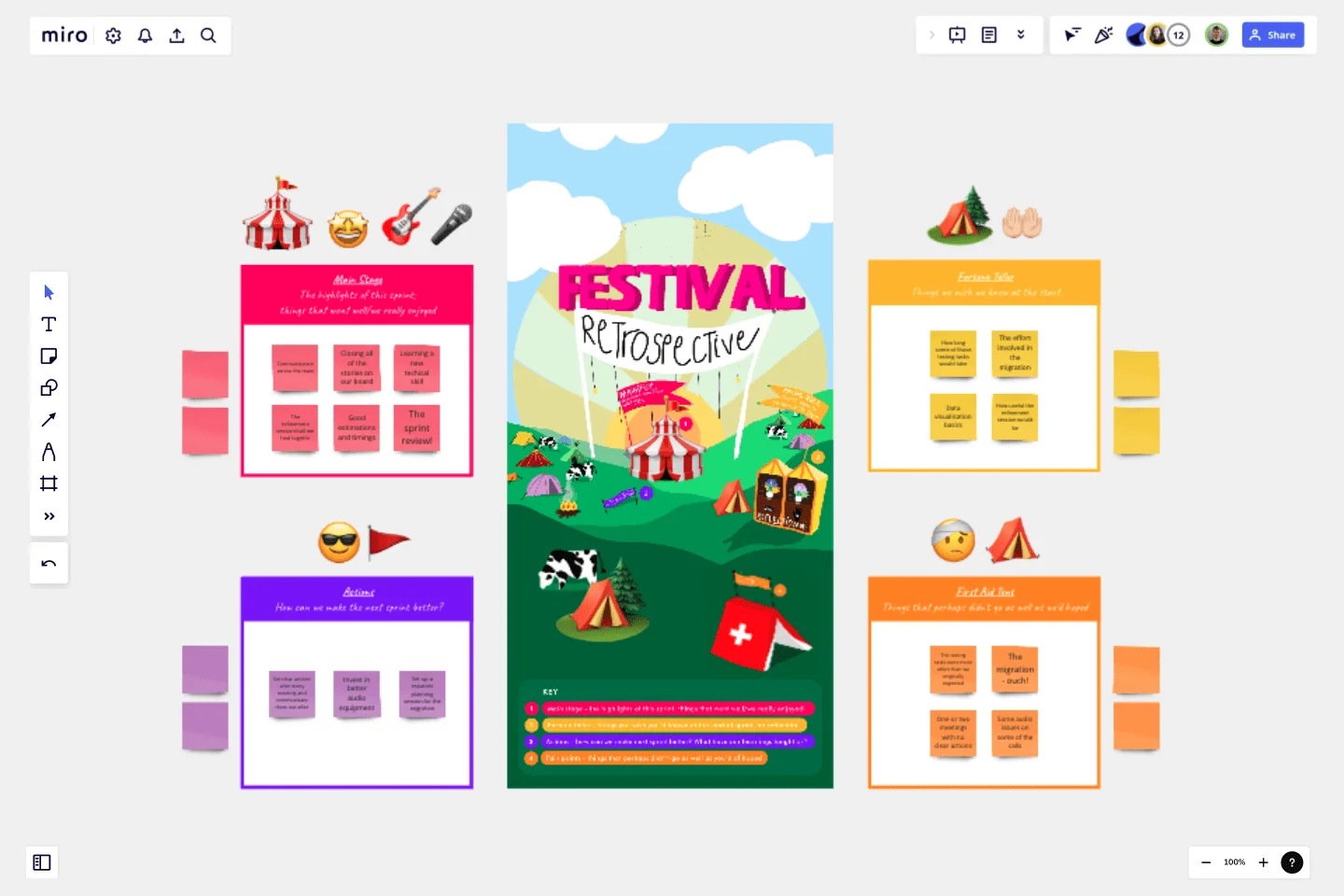Festival Retrospective
The festival themed retrospective has been designed using the metaphors and common areas of a festival for teams to share ideas and key themes
The retrospective is broken up into four main areas:
The Main Stage - highlights of the sprint/iteration; things that went well and that the team enjoyed
Fortune Teller - things we wish we knew at the start
First Aid Tent - pain points; things that perhaps didn't go as well as we'd have hoped
Actions - how can we make the next sprint/iteration better?
Use the blank post-it templates available and some of the example post-its as a starter and work your way around the board from Main Stage, to Fortune Teller, to the First Aid Tent, where the pain points identified by the team help to drive conversation and insight into the final Actions section.
Enjoy!
Credit for the creative and design to some of the fantastic designers working at Dyson.
Discover how Miro's retro tool can help you run more engaging and inclusive retrospective sessions.
Get started with this template right now.
Agile Retrospective
Works best for:
Retrosprective, Agile Methodology, Meetings
The Agile Retrospective template offers a dynamic and adaptive framework for teams practicing agile methodologies. It provides elements for reflecting on sprint performance, identifying bottlenecks, and planning improvements. This template enables teams to adapt and refine their processes continuously, fostering a culture of learning and innovation. By promoting agility and adaptability, the Agile Retrospective empowers teams to optimize their workflows, drive continuous improvement, and deliver value to their stakeholders effectively.
Product Evolution Canvas
Works best for:
Product Management, Planning
The Product Evolution Canvas template aids product managers in planning and executing product evolution strategies. By mapping out current product features, identifying areas for improvement, and setting evolution goals, this template guides product evolution efforts. With sections for analyzing user feedback, prioritizing enhancements, and tracking progress, it facilitates iterative product development and enhancement cycles. This template serves as a roadmap for evolving products to meet evolving customer needs and market demands.
Backlog Refinement with Jira Template
Works best for:
Agile, Backlog Refinement
The Backlog Refinement with Jira template in Miro improves collaboration among team members. It provides a visual and interactive space for teams to review, prioritize, and clarify upcoming work items together in real time. This collaborative approach ensures alignment on priorities and details, leading to a more organized and efficient workflow. The seamless integration with Jira automatically syncs all changes, reducing the need for manual updates and keeping both platforms up-to-date.
Define A Winning Product Vision
Works best for:
Product Management, Planning
The Define A Winning Product Vision template assists product teams in articulating compelling visions for product development. By defining goals, target markets, and differentiation strategies, this template aligns teams around a shared vision for success. With sections for outlining product features, benefits, and value propositions, it communicates the essence of the product effectively. This template serves as a guiding light for product development efforts, inspiring creativity and focus as teams work towards bringing the product vision to life.
Lean Project Charter
Works best for:
Agile
The Lean Project Charter template provides a streamlined approach to defining project objectives, scope, and success criteria. It emphasizes clarity, brevity, and alignment with Lean principles, enabling teams to kickstart projects with focus and purpose. This template empowers teams to set clear goals, establish shared understanding, and align stakeholders, driving efficiency and effectiveness in project delivery. By promoting transparency and accountability, the Lean Project Charter sets the foundation for successful project execution and continuous improvement.
Sprint Planning Template
Works best for:
Agile, Sprint Planning
The Sprint Planning Template is a useful tool for agile teams to organize and conduct sprint planning sessions. It enhances team collaboration and communication by providing a clear visual layout of sprint goals, tasks, and timelines. The interactive design ensures team alignment toward sprint objectives, leading to effective teamwork. The template is a central hub for planning, discussion, and decision-making, creating a collaborative and productive environment.
